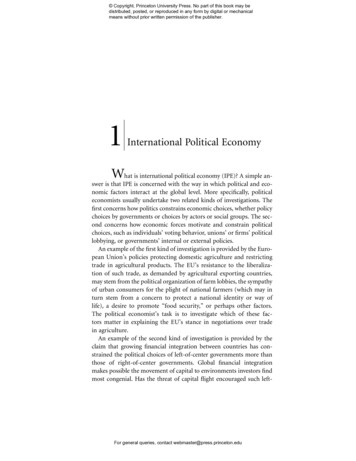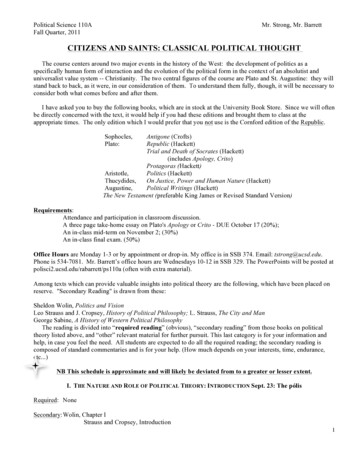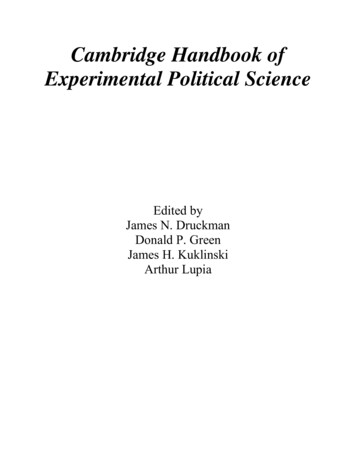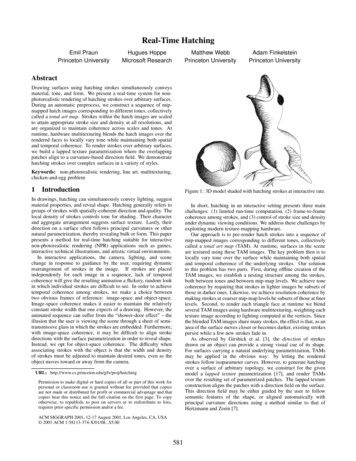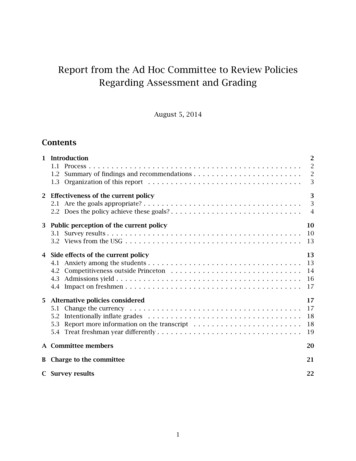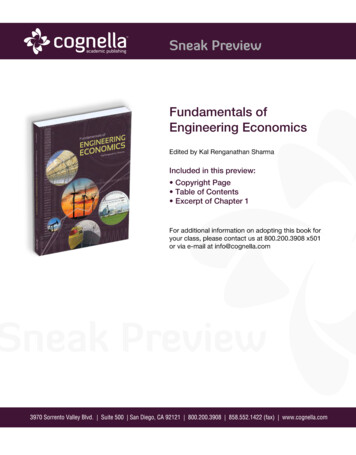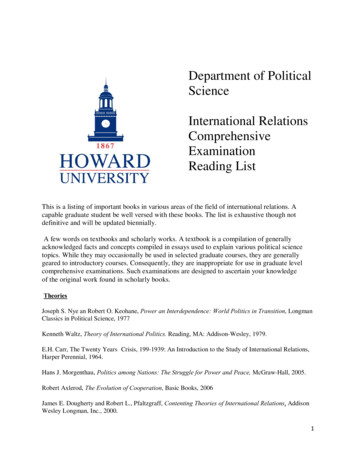
Transcription
Copyright, Princeton University Press. No part of this book may bedistributed, posted, or reproduced in any form by digital or mechanicalmeans without prior written permission of the publisher.C H A P T E RO N EWhat Is Political Economy?Economists must not only know their economic models,but also understand politics, interests, conflicts, passionsᎏthe essence of collective life. For a brief period of time youcould make changes by decree; but to let them persist,you have to build coalitions and bring people around.You have to be a politician.ᎏAlejandro Foxley, Chilean Minister of Finance(quoted in Williamson and Haggard [1994])1.1. INTRODUCTIONHow does politics affect economic outcomes? This question has beenasked probably as long as people have been interested in economics itself.From Adam Smith’s Wealth of Nations in 1776 Žor perhaps the Physiocratseven earlier . until at least John Stuart Mill’s Principles of Political Economy in 1848, what we now call ‘‘economics’’ was in fact generally referredto as ‘‘political economy.’’1 This terminology in large part reflected thebelief that economics was not really separable from politics. This was morethan an administrative classification of disciplines; it arose from thewidespread view that political factors are crucial in determining economicoutcomes. Hence, as a discipline economics historically viewed politicalforces not only as influencing economic outcomes, but often as a determining influence.With the division of economics and political science into distinct disciplines, economists abstracted from political and institutional factors. Thedesire for methodological progress and for a more rigorous basis foreconomic analysis were important motivations in this separation. Thedevelopment of neoclassical economics stressed optimization by consumersand firms subject to well-defined constraints and a market environment,1According to Groenewegen Ž1987., the term ‘‘political economy’’ for economics originated in France in the 17th century. He attributes the first use to Montchretienin 1615. Sir James Steurt Ž1761. was the first English economist to put the term in the title of a book oneconomics, An Inquiry into the Principles of Political Economy.For general queries, contact webmaster@press.princeton.edu
Copyright, Princeton University Press. No part of this book may bedistributed, posted, or reproduced in any form by digital or mechanicalmeans without prior written permission of the publisher.4C H A P T E R O N Edeliberately downplaying more amorphous political factors. Those determinants of economic outcomes easily formalized in this choice-theoreticframework were stressed in the development of neoclassical economics;those not easily formalized were seen as largely the province of otherdisciplines.Interest in the question of how politics affects economic outcomes maythus appear new to someone trained solely in modern neoclassical economics; in fact, it is not. One may want to keep the history of this interestin mind in assessing phrases such as ‘‘explosion of interest’’ or ‘‘recentflood of work’’ applied to current research in political economy. Nonetheless, looking at what has been happening in the past few years, suchphrases are quite accurate. Of late, there really has been an explosion inthe number of papers looking at the effect of politics on economicoutcomes. Leading journals are filled with articles on the ‘‘political economy of’’ one economic phenomenon or another; specialty journals havebeen started; conferences on a specific economic issue typically have atleast one paper on the politics of the issue, not to mention numerousconferences devoted solely to political economy. In short, it appearsjustified to speak of the ‘‘new political economy’’ as an important field ofcurrent research and to conclude that this is not simply a fad, but an areaof analysis that is here to stay.2 In short, political economy falls into thatspecial class of things that seem quite old and musty and quite young andfresh at the same time.The ‘‘new political economy’’ is not, however, just a resurrection of anearlier approach to economics. Though characterized by a strong interestin the question of how politics affects economic outcomes, the newpolitical economy is defined more by its way of approaching this question.Specifically, it is defined in large part by its use of the formal and technicaltools of modern economic analysis to look at the importance of politics foreconomics. Modern economic analysis is used not just in the formal senseof a mathematical approach; it is also conceptual, viewing political phenomena in terms of optimization, incentives, constraints, et cetera. Hence,what really distinguishes the new political economy is not so much thevolume, but the sort of research being done.3Formal technique sometimes clouds, rather than enhances, our understanding of phenomena, and sometimes seems to be used as a substitutefor insights into the phenomenon being studied. The relative newness ofpolitical economy in its current form may make this problem more acute.It has led some people to the perception, incorrect in my opinion, that the2One should, however, note that when asked to assess the significance of the FrenchRevolution, Chinese Premier Chou En-Lai is said to have replied, ‘‘It is too soon to tell.’’3For example, Alt and Shepsle Ž1990. defined political economy as the study of rationaldecisions in the context of political and economic institutions, stressing explicit microfoundations based on rational actors.For general queries, contact webmaster@press.princeton.edu
Copyright, Princeton University Press. No part of this book may bedistributed, posted, or reproduced in any form by digital or mechanicalmeans without prior written permission of the publisher.W H A TI SP O L I T I C A LE C O N O M Y ?5new political economy is simply a not very insightful formalization of theobvious. Recent research has also been criticized as being too broad, seenas trying to cover everything, with widely differing degrees of success.Both the strengths and the weaknesses of the new political economysuggest the need for a more organized treatment. In this book, I not onlysurvey recent work on political economy in macroeconomics, but alsoattempt to organize the work. As such, the approach is somewhere between a textbook and a monograph. It is meant not only to summarize,organize, and critique the existing literature, attempting to guide thereader through the wilderness, but also, like a monograph, to present avery specific view of the field. I argue that heterogeneity and conflict ofinterests are essential to political economy and should be the organizingprinciples of the field. However, whether or not a reader finds himself inagreement with this point of view, he should find an organized treatmentof the field very useful. Those readers who do agree with the central roleof conflict of interests may thereby gain not only an understanding ofdifferent parts of the field, but also a better sense of how they fit together.1.2. POLITICSANDECONOMICSWhat is the new political economy? A general definition is that it is thestudy of the interaction of politics and economics. Though such a vaguedefinition may have the virtue of being all-inclusive, it gives no real senseof what is being studied. It is like describing the taste of French cooking bysaying it results from the interaction of France and cooking. It is technically correct, but one misses the real flavor. Our first task, therefore, is toattempt to provide a definition that will indicate what makes a questionone of political economy, and how political economy differs from ‘‘straight’’economics or from other areas of economics concerned with policy choice.How, for example, is political economy different than the well-developedtheories of public finance and public economics? How does it differ fromthe theory of public choice?Some Preliminary DefinitionsA famous definition of economics is that of Lionel Robbins Ž1932, p. 16.,‘‘Economics is the science which studies human behavior as a relationshipbetween ends and scarce means that have alternative uses.’’ If economicsis the study of the optimal use of scarce resources, political economybegins with the political nature of decisionmaking and is concerned withhow politics will affect economic choices in a society. Society should bedefined broadly to include not only countries or other such jurisdictions,but also firms, social groups, or other organizations.For general queries, contact webmaster@press.princeton.edu
Copyright, Princeton University Press. No part of this book may bedistributed, posted, or reproduced in any form by digital or mechanicalmeans without prior written permission of the publisher.6C H A P T E R O N EObviously, we cannot go much further without being more precise aboutwhat we mean by the term ‘‘politics.’’ In the political science literaturepolitics is defined as the study of power and authority, and the exercise ofpower and authority. Power, in turn, means the ability of an individual Žorgroup. to achieve outcomes which reflect his objectives.4 Similarly, authority ‘‘exists whenever one, several, or many people explicitly or tacitlypermit someone else to make decisions for them in some category of acts’’ŽLindblom, w1977x, pp. 17 18. Thus, for example, Lindblom defines politicsas the struggle over authority. As he puts it Žp. 119., ‘‘In an untidy processcalled politics, people who want authority struggle to get it while others tryto control those who hold it.’’For our purposes, the most important part of these definitions is what isimplicit and taken for granted. Questions of power and authority arerelevant only when there is heterogeneity of interests, that is, a conflict ofinterests between economic actors in a society. How then does a societymake collective policy decisions that affect it as a whole when individualmembers have conflicting interests? How do individuals, classes, or groupswithin a larger society gain power or authority to attempt to have thesocietal choice reflect their preferred course of action? Politics may bethought of generally as the study of mechanisms for making collectivechoices. Asking how power or authority are attained and exercised can bethought of as a specific form of the general question of what mechanismsare used to make collective decisions.5With this as a basis, we can return to the question of what politicaleconomy studies. The view that economics is the study of the optimal useof scarce resources contains an implicit, but crucial, assumption whenapplied to policy choice, namely, that once the optimal policy is found, it willbe implemented. The problem of policy choice is simply a technical orcomputational one. Once the optimal policy has been calculated, thepolicymaker then implements it, where this decision is taken as automatic.That is, since the policymaker is a social welfare maximizer, it is taken asgiven that once an optimal policy is derived, this is the policy that will becarried out. This identity of optimal and actually chosen action implies thata positive economics of policy choice follows almost immediately from thenormative economics of policy choice. Note that the process of decidingtechnically what policy to adopt, the decision central to this approach, isvery different from the process of deciding on policy which the definitionof politics would suggest.4For example, Weber Ž1947, p. 152. defined power as ‘‘the probability that an actor in asocial relationship will be in a position to carry out his own will despite resistance, regardlessof the basis on which this probability rests.’’5Keohane Ž1984, p. 21. writes, ‘‘wherever, in the economy, actors exert power over oneanother, the economy is political.’’For general queries, contact webmaster@press.princeton.edu
Copyright, Princeton University Press. No part of this book may bedistributed, posted, or reproduced in any form by digital or mechanicalmeans without prior written permission of the publisher.W H A TI SP O L I T I C A LE C O N O M Y ?7Political economy thus begins with the observation that actual policiesare often quite different from ‘‘optimal’’ policies, the latter defined assubject to technical and informational, but not political, constraints. Political constraints refer to the constraints due to conflict of interests and theneed to make collective choices in the face of these conflicts. Positivepolitical economy thus asks the question how political constraints mayexplain the choice of policies Žand thus economic outcomes. that differfrom optimal policies, and the outcomes those policies would imply. To putthe same point another way, the mechanisms that societies use in choosingpolicies in the face of conflicts of interest will imply that the result willoften be quite different than what a benign social planner would choose.6This positive view implies a normative approach as well: normative political economy would ask the question of how, given the existing politicalconstraints, societies can be led to best achieve specific economic objectives. This includes not only how to ‘‘overcome’’ political constraints withinthe existing institutional framework, but also the design of political institutions to better achieve economic objectives.Some ExamplesThis definition of positive political economy may be better understood byreference to some examples of the questions it addresses. Some phenomena are so clearly in the realm of political economy that little discussion isrequired as to what are the political influences on the economic outcomes.For example, it is often argued that there is an opportunistic politicalbusiness cycle, with pre-election economic policies and outcomes influenced by the desire of the incumbent to manipulate the economy in orderto improve his re-election prospects. Or, even if incumbents do not, orsimply cannot, manipulate the economy before an election, the fact ofpossible changes in the government after an election may have significanteffects on policies and outcomes. If policies were made by an infinitelylived social welfare-maximizing planner who was sure to retain his job Žitis, after all, hard to find replacements these days., there would be no effecton policies from the possibility that the policymaker will be replaced. Weconsider the myriad effects of this possibility in Chapter 7.In other cases, the role of political constraints may be less in theforeground, but no less important. Consider an economy experiencinghyperinflation, where there is agreement that hyperinflation imposes verylarge costs on all members of society. The technical problem is how to6The importance of conflict of interests is appreciated in some of the literature in publicfinance. Atkinson and Stiglitz Ž1980, p. 298., for example, write, ‘‘If everyone had identicaltastes and endowments, then many public finance questions would lose their significance, andthis is particularly true of the behavior of the state. If the interests of the members of societycould be treated as those of a ‘representative’ individual, then the role of the state would bereduced to that of efficiently carrying out agreed decisions.’’For general queries, contact webmaster@press.princeton.edu
Copyright, Princeton University Press. No part of this book may bedistributed, posted, or reproduced in any form by digital or mechanicalmeans without prior written permission of the publisher.8C H A P T E R O N Ereduce the inflation at the least possible cost. Experience of many countries which have suffered from hyperinflations indicates that a necessarycomponent of inflation reduction is greatly reducing the governmentbudget deficit. Having this information, a welfare-maximizing policymakerwould cut the government budget deficit. What we observe in fact is that inmany high-inflation economies, where it is agreed that deficit reduction isa necessary component of an inflation stabilization program, deficit reduction is long delayed while inflation accelerates. The positive politicaleconomy question is whether the political constraints on making budgetarydecisions can explain this delay, and, furthermore, how the length of delaywill reflect different political mechanisms for resolving budgetary conflicts.The normative political economy question is how to design policies ormechanisms for choosing policies which will hasten agreement on how tocut the budget deficit. This approach to the political economy of hyperinflation will be addressed in Chapter 10.To take another example, consider the question of the transition of theformerly socialist countries of Central and Eastern Europe to marketeconomies. Though it is generally agreed that economic efficiency andsocial welfare will be substantially higher once a market system of allocation is in place, the transition has been slow, far slower than observersexpected at the outset on the basis of the technical constraints. Politicalopposition from groups that will be hurt in the transition and under thenew regime has been a significant factor in determining the pace ofreform. Hence, crucial to understanding transition policies and theiroutcomes are the conflicts between different interest groups in the economy. The relative performance of different transition economies reflectsnot only their differing economic characteristics, but differing politicalcharacteristics as well. We consider the political economy of large-scaleeconomic reform and transition in Chapter 13.Disciplines ComparedGiven the definition of new political economy, one may ask how it differsfrom the related fields of public economics Žor public finance. and ofpublic choice. Public economics is concerned generally with the economicsof the public sector, meaning how economic decisions of the governmentaffect economic actors. Positive public economics concerns the effects oftax and expenditure policies on individual and firm behavior. Althoughpositive public economics broadly defined includes political theories of thestate, the main focus is on the effect of tax and expenditure policies. Tothe extent that public economics addresses the question of how tax andexpenditure policies are chosen, it is primarily from the perspective ofneoclassical welfare economics, that is, taking the government’s objectiveof welfare maximization as given and asking how tax and expenditurepolicies, rather than direct ‘‘command,’’ may be used to achieve theobjective of welfare maximization. This is the subject matter of normativeFor general queries, contact webmaster@press.princeton.edu
Copyright, Princeton University Press. No part of this book may bedistributed, posted, or reproduced in any form by digital or mechanicalmeans without prior written permission of the publisher.W H A TI SP O L I T I C A LE C O N O M Y ?9public economics. One area of normative public finance is the formulationof simple criteria for government decisionmaking, but this is not in termsof choosing the objective to be maximized, but of choosing criteria andmethods to achieve the optimum.7The question of how the objectives are chosen, that is, how collectivechoices are made, is the subject matter of public choice. That is, publicchoice is concerned largely with studying decisionmaking mechanisms perse, considering not only the positive and normative aspects of differentways of making collective choices, but also the question of how a societycan choose over the set of possible choice mechanisms. Public choicediffers from political science, in that it stresses the use of tools ofeconomic analysis to study collective choices. As Mueller Ž1989, p. 1.concisely defines it, ‘‘Public choice can be defined as the economic study ofnonmarket decision making, or simply the application of economics topolitical science.’’ We consider the subject matter of public choice in a bitmore detail in our treatment of decisionmaking mechanisms in Chapter 3and again in Chapter 9 in the discussion of problems of collective action.Public choice and political economy as defined here are clearly closelyrelated. Many treatments of the new political economy would not make adistinction between the fields, arguing that public choice is an integral partof the new political economy. There is much to this argument. First, bothpublic choice and new political economy, namely, the study of the effectsof political constraints on economic outcomes using specific analyticaltools, are defined not so much by their subject matter as by their analyticaland methodological approach. Second, since policy outcomes may dependon the intricacies of the decisionmaking process Žconsider, for example,the formulation of international trade policy., it may be unproductive tomake a distinction between the fields in specific applications. Our distinction is meant more to highlight the subject matter of this book. Ourinterest is in the effect of politics on economic outcomes, not on politicsper se. Though the stress is on using tools of economic analysis, the interestis not in choice mechanisms themselves. Moreover, there are alreadyexcellent textbook treatments of public choice and mathematical political science by practitioners, while there is no comprehensive textbooktreatment of the effects of politics on macroeconomic outcomes in anygenerality.1.3. TYPESOFHETEROGENEITYWhat ties politics, public choice, and political economy together is thecentrality of heterogeneity of interests. Were there no heterogeneity ofpreferences over outcomes, there would be no need for a mechanism to7The subject matter of normative public finance will be touched on at many points in thebook, especially in the discussion of public goods in Chapter 9.For general queries, contact webmaster@press.princeton.edu
Copyright, Princeton University Press. No part of this book may bedistributed, posted, or reproduced in any form by digital or mechanicalmeans without prior written permission of the publisher.10C H A P T E R O N Eaggregate individual preferences into a collective choice. Similarly, werethere no conflicts of interests whatsoever, the choice of economic policywould be that of the social planner maximizing the utility of the representative individual. ŽRemember the quote from Atkinson and Stiglitz Ž1980.in footnote 6. It is heterogeneity of interests that is the basis of the fieldof political economy.At this point, one may argue that heterogeneity of interests is alsocentral to much of economics. Markets are driven by heterogeneity as well,heterogeneity of tastes, of endowments, and of expectations. Why nottherefore argue that heterogeneity is the basis not only of the field ofpolitical economy, but also of market economics itself? The argument onthe importance of heterogeneity for political economy may be summarizedin two propositions. First, heterogeneity or conflict of interests is necessaryfor there to be political constraints. Second, the effect of politics oneconomics follows from the mechanisms by which these conflicts areresolved. The first point is clearᎏheterogeneity is a necessary condition. Itcan be read as saying only that without heterogeneity, there would benothing to study. It is the second which is really our focus, and, to mymind, defines political economy. Heterogeneity is also necessary for thereto be markets, but heterogeneity of interests plays out quite differentlywhen addressed through the market than through the political process. Forexample, the effect of heterogeneity of abilities on distribution of incomemediated simply through the market will be quite different than theincome distribution which would result when individuals can lobby fortransfers, based on their endowed abilities. How much different willdepend on the political mechanism by which tax-and-transfer policy isdecided.8 Moreover, there are numerous issues where individuals have aheterogeneity of interests where the market mechanism either cannot beused or simply is not used to determine outcomes, the political choicemechanism being used instead.Given the necessity of conflict of interests for there to be a politicaleconomy problem, one is led to ask: what are important types of heterogeneity for political economy? There are many, which we find useful toseparate into two basic classes, giving rise to two crucial types of conflict ofinterests. The first conflict reflects underlying heterogeneity of actors‘‘coming into’’ the political arena, implying they have different policypreferences. There are a number of reasons. They may simply havedifferent tastes over goods, broadly defined, or different relative factorendowments. They may find themselves in different situations not easilysummarized in terms of tastes or endowments that lead them to preferdifferent policies. Or, they may just differ in how they think the worldworks, and hence what policies would best achieve a given aim. In short,8Lindblom Ž1977. discusses at length the conceptual differences between markets andpolitical institutions as allocation devices, and the implications of these differences.For general queries, contact webmaster@press.princeton.edu
Copyright, Princeton University Press. No part of this book may bedistributed, posted, or reproduced in any form by digital or mechanicalmeans without prior written permission of the publisher.W H A TI SP O L I T I C A LE C O N O M Y ?11individuals are heterogeneous in a number of dimensions, leading them toprefer different policies ex ante. We apply to this heterogeneity the generalterm ex-ante heterogeneity, which plays a crucial role in political economy.There is another central type of heterogeneity. Even when political-economic actors have the same ‘‘primitives’’ᎏendowments, preferences, etc.ᎏthere will generally still be a conflict of interests. Actors may all equallyvalue a good, but there is conflict if its distribution Žif it is private. or thedistribution of the costs of providing it Žif it is public. is determined by acollective choice. Economic policies generally have distributional implications. Therefore, when a policy does Žor can. have distributional consequences, self-interested ‘‘representative’’ agents will be in conflict overdistribution. This includes the rents that office-holding may provide tothose in office, whether these are pecuniary benefits or simply the ‘‘egorents’’ associated with holding office. Since ‘‘distribution’’ can also refer toconflicts arising from ex-ante heterogeneity of factor endowments, we usethe general term ex-post heterogeneity for this type of heterogeneity.These two concepts of heterogeneity will appear in various formsthroughout the book. One should note that these are not by any meansmutually exclusive. In discussions of supply of a public good, for example,there may be conflict over the importance of the public good relative toother expenditures, reflecting ex-ante heterogeneity, as well as conflictover who should bear the cost of supplying the public good, which isex-post heterogeneity. To take another example, conflict over the size ofincome assistance programs in the budget combines distribution of aprivate good whose burden may be seen as a public good, not to mentionthe ideological conflict over the proper role of the state in providingincome transfers.We end this section with two notes on the relevance of our argumentthat heterogeneity of interests is central to political economy. First, ex-postheterogeneity is important not only in questions of income redistribution,but also in understanding the political aspects of some ‘‘representative’’agent problems, problems where it might initially appear that heterogeneity plays no substantial role. Specifically, consider imperfect credibility ofpolicy due to the possibility of time inconsistency, which is the subject ofChapter 4. Time inconsistency is said to arise if the optimal policy chosenat t 1 for date t 1 differs from the optimal policy for t 1 which was chosen att 0 - t 1 , even though technology, preferences, and information are thesame at the two dates. Time inconsistency refers to more than a policymaker announcing a policy for t 1 at t 0 and then enacting a different policyat t 1 if it suits his own interests. Time inconsistency is especially interesting because it can arise even when the planner is maximizing the welfareof a representative individual. Hence, heterogeneity would appear to playno role. We will argue in Chapter 4 that this is not correct. In modelswhere the government is maximizing the welfare of a representativeindividual, time inconsistency arises only when there is an importantFor general queries, contact webmaster@press.princeton.edu
Copyright, Princeton University Press. No part of this book may bedistributed, posted, or reproduced in any form by digital or mechanicalmeans without prior written permission of the publisher.12C H A P T E R O N Eex-post heterogeneity. That is, in such models all individuals may beidentical ex ante, but are not identical ex post. In fact, we shall argue thatex-post heterogeneity is key to the possibility of time inconsistency in thepresence of a ‘‘benevolent’’ government.9Second, the reader may still feel uncomfortable with the argument thatthe distinction between political and nonpolitical problems turns on theheterogeneity of interests and how they are handled. We had indicatedabove that markets are also driven by heterogeneity, but that the effects ofheterogeneity are quite different when mediated in the market than whenaddressed by a political process or social planner. What about the study ofsocial welfare maximization with heterogeneous individuals? This is thetopic of multiple-agent welfare economics, where ex-ante or ex-post heterogeneity of actors is central to the analysis of optimal policy choice. Howdoes it differ from political economy? Though heterogeneity is central toboth areas, there is a key difference. We
4 CHAPTER ONE deliberately downplaying more amorphous political factors. Those determi-nants of eco


